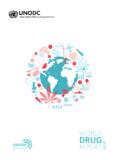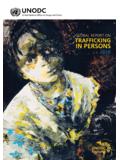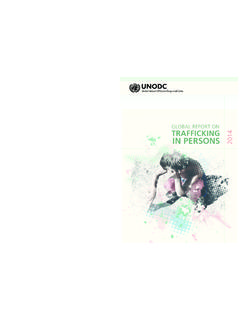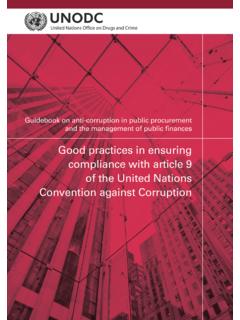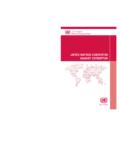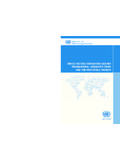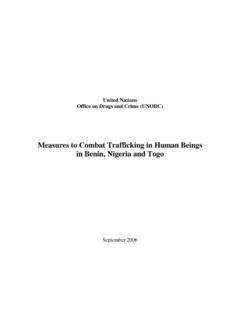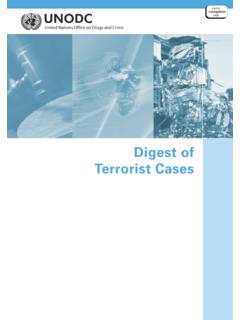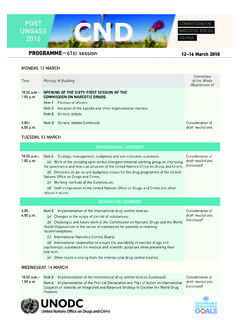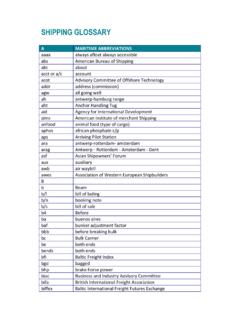Transcription of Foreign Terrorist Fighters
1 Foreign Terrorist FightersManual for Judicial Training InstitutesSouth-Eastern EuropeCover images: , NATIONS OFFICE ON DRUGS AND CRIMEV iennaForeign Terrorist Fighters Manual for Judicial Training Institutes South-Eastern EuropeUNITED NATIONSV ienna, 2017 United Nations, September 2017. All rights reserved, designations employed and the presentation of material in this publication do not imply the expression of any opinion whatsoever on the part of the Secretariat of the United Nations concerning the legal status of any country, territory, city or area, or of its authorities, or concerning the delimitation of its frontiers or production: English, Publishing and Library Section, United Nations Office at year, acts of terrorism kill, injure and harm thousands of innocent victims of all races, cultures and religious beliefs all over the world.
2 In the past, victims of crime, including terrorism, have too often been the forgotten parties in the criminal justice system. In recent years, however, there has been greater recognition of the rights and roles that these important actors have within the criminal justice framework. An integral part of the international community s efforts to counter terrorism is bring-ing perpetrators of Terrorist acts to justice and holding them to account for their actions, in accordance with the rule of law and human rights. This fundamental principle requires that Member States establish and implement effective, rule of law-based national measures for the investigation and prosecution of such crimes, and to protect and sup-port victims of such crimes, within the criminal justice system.
3 In light of this, the United Nations Office on Drugs and Crime (UNODC) was requested by Member States in General Assembly resolution 68/187 of 18 December 2013, among other measures, to continue to enhance specialized legal knowledge through the prepa-ration of best practices, in close coordination with Member States, on assistance to and support for victims of terrorism, including the role of victims within the criminal justice framework . This publication represents the outcome of an expert group meeting convened by UNODC and held on 24 and 25 November 2014. At this meeting, experts from Mem-ber States, the United Nations, civil society and relevant bodies met to share experiences and discuss challenges and approaches to providing greater support to victims of ter-rorism within the criminal justice framework.
4 As a result of these discussions and deliberations, including on available international, multilateral and regional instruments and normative frameworks, the experts elaborated a number of recommended good practices, which are set out in this publication. These recommendations are aimed at assisting Member States to establish and enhance policies, laws and institutional capacity to provide improved outcomes for victims, while fully respecting the rule of law and rights of accused persons. We hope the publication will contribute to the growing body of jurisprudence in this important subject area. Yury Fedotov Executive Director United Nations Office on Drugs and CrimeivvContentsForeword.
5 IiiIntroduction .. 11 . The Foreign Terrorist fighter phenomenon .. Scope of the term Foreign Terrorist fighter .. 32 . Foreign Terrorist Fighters the international legal framework .. The international legal framework .. 73 . Criminal offences related to Foreign Terrorist Fighters .. Public provocation to commit a Terrorist offence article 5 (CETS 196) .. Recruitment for terrorism article 6 (CETS 196) .. Training for terrorism article 7 (CETS 196) .. Participating in an association or group for the purpose of terrorism article 2 (CETS 217) .. Receiving training for terrorism purposes article 3 (CETS 217).
6 Travelling abroad for the purpose of terrorism article 4 (CETS 217) .. Funding travelling abroad for the purpose of terrorism article 5 (CETS 217) .. Organising or otherwise facilitating travelling abroad for the purpose of terrorism article 6 (CETS 217) .. 244 . Investigation of offences related to Foreign Terrorist Fighters .. Introduction .. Online investigations .. What evidence to collect .. How to collect e-evidence .. Special investigative techniques and Foreign Terrorist Fighters .. Financial components of Foreign Terrorist fighter investigations.
7 50viAnnexesList of international legal instruments related to terrorism and Foreign Terrorist Fighters .. 63 Basic tips for investigators and prosecutors for requesting electronic/digital data/evidence from Foreign jurisdictions .. 64viiAbbreviationsCHIS Covert Human Intelligence SourceCII Covert Internet InvestigatorCSV Comma Separated ValueDHCP Dynamic Host Configuration Control ProtocolECHR European Convention for the Protection of Human Rights and Fundamental Freedoms (European Convention on Human Rights)ECtHR European Court of Human RightsESI Electronically Stored InformationEXIF Exchangeable Image File FormatFIU Financial Intelligence UnitFTF Foreign Terrorist FightersFTP File Transfer ProtocolGIMF Global Islamic Media FrontGPS Global Positioning SystemHTML Hypertext Markup LanguageIACP International Association of Chiefs of PoliceICCPR International Covenant on Civil and Political RightsIP Internet ProtocolISP Internet Service ProviderMLA Mutual Legal AssistanceOS Operating systemOSINT Open Source IntelligenceP2P Peer-to-PeerRAM Random Access MemorySEE South-Eastern EuropeSNA Social Network
8 AnalysisTCP Transmission Control ProtocolUN United NationsUNODC United Nations Office on Drugs and CrimeURL Uniform Resource LocatorUSB Universal Serial BusVPN Virtual Private Network1 IntroductionThe mission of United Nations Office on Drugs and Crime (UNODC) is to contribute to the achievement of security and justice for all by making the world safer from crime, drugs, and terrorism. In the context of global counter-terrorism, UNODC is mandated to provide assistance to requesting countries in their efforts to address the legal and criminal justice aspects of countering terrorism. There are several trends that can be observed regarding terrorism in the last few First of all, Terrorist attacks have increasingly targeted private citizens.
9 While the total number of deaths as a result of Terrorist attacks rose by 80 per cent between 2013 and 2014, the deaths of civilians increased by 172 per cent during that same period. Fur-ther, Boko Haram and Islamic State of Iraq and the Levant (ISIL/Da esh) were jointly responsible for 51 per cent of all claimed global fatalities in The Foreign Terrorist Fighters (FTF) phenomenon is a growing threat to many countries. The flow of FTF into Iraq and Syria continued in 2014 and 2015 and it is estimated that between 25,000 and 30,000 FTF have arrived to Syria and Iraq since Reports identify South-Eastern Europe (SEE) as one of the main sources of FTF, along with Western Europe and the Middle East.
10 Features common to people leaving Western Balkan countries for Syria and Iraq include links to diasporas in the EU, particularly in Austria and Germany; pre-departure criminality; poor education; unemployment; dysfunctional or broken families; and mental health issues. With regard to motives, individuals often attempt to escape something unhappy marriages, domestic violence, debt, criminal prosecution, alcohol and drug abuse or seek something, such as a spouse, an adventure, or belonging and purpose in life through The average age of FTF from the Western Balkans in Syria and Iraq is 31 for males and 30 for females.
